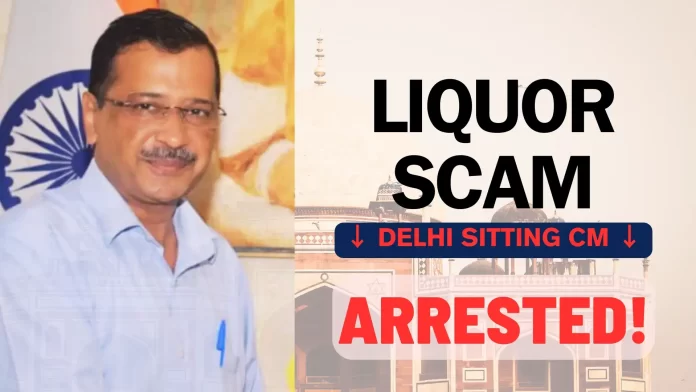Arvind Kejriwal, the Chief Minister of Delhi, was arrested by the Enforcement Directorate (ED) on March 21, 2024. The arrest is related to the Delhi Liquor Policy (DLP) case, which involves allegations of corruption. The ED is investigating money laundering in connection with the city’s liquor policy. Kejriwal was remanded to the ED’s custody until March.
The ED sought an extension of his custody, and the Rouse Avenue Court in Delhi has now extended it until April 1. During the remand, data from one mobile phone (belonging to Kejriwal’s wife) was extracted and analyzed. However, data from the other four digital devices seized during the search at Kejriwal’s premises are yet to be extracted, as he has sought time to provide password/login credentials after consulting with his lawyers. Kejriwal has not disclosed the passwords, and the ED may need to break open the passwords if he does not cooperate. The ED also stated that Kejriwal needs to be confronted with other individuals in the investigation.
Kejriwal, in response to media queries, called his arrest a political conspiracy and asserted that the public would give a befitting reply. The situation has sent shockwaves through the political landscape.
The key details of Delhi Liquor Policy:
The Delhi Liquor Policy case is a significant political scandal related to the Delhi Government’s Excise Policy implemented from 2021 to 2022.
Policy Introduction:
- In November 2021, the Delhi government, under the leadership of Arvind Kejriwal, introduced a new excise policy aimed at modernizing alcohol sales in the city.
- The policy received mixed reviews, with some praising its progressive approach while others expressing concerns about its financial and public health implications.
Violations and Allegations:
- In July 2022, Delhi’s Chief Secretary Naresh Kumar reported violations in the policy to Lieutenant Governor (L-G) Vinai Kumar Saxena.
- The violations were related to financial losses to the exchequer, amounting to more than Rs 580 crore.
- The Enforcement Directorate (ED) alleged that the policy was intentionally designed with loopholes to favour AAP leaders and promote cartel formations.
- AAP leaders were accused of receiving kickbacks from liquor businesses in exchange for preferential treatment, including discounts, license fee waivers, and relief during the Covid-19 pandemic disruptions.
Specific Allegations:
- The ED claimed that the “scam” involved giving wholesale liquor businesses to private entities with a fixed margin of 12%, in return for a 6% kickback.
- AAP leaders were also accused of influencing elections held in Punjab and Goa in early 2022.
High-Profile Arrests:
- Arvind Kejriwal’s arrest is the third high-profile arrest of an AAP leader connected to this case.
- The Delhi High Court had refused to grant him protection from arrest in the liquor policy case.
- Kejriwal was arrested for failing to comply with nine previous summonses from the ED for questioning.
Ongoing Investigation:
- The CBI conducted raids targeting then Deputy Chief Minister Manish Sisodia and three others.
- Sisodia and 14 other accused, including AAP communications in-charge Vijay Nair, were named in the FIR.
- Vijay Nair was arrested in September 2022.
Key Allegations in Delhi Liquor Policy
The Delhi Liquor Policy case involves several specific charges against AAP leaders, including Arvind Kejriwal and Manish Sisodia.
Corruption and Favoritism:
- The AAP government introduced a new excise policy in 2021 aimed at reforms in the liquor sector, including privatization of liquor stores and changes in licensing criteria. However, allegations of corruption and favoritism marred the policy’s implementation.
- AAP leaders were accused of receiving kickbacks from liquor businesses in exchange for preferential treatment, such as discounts, license fee waivers, and relief during the Covid-19 pandemic disruptions.
Specific Charges Against Arvind Kejriwal:
- The Enforcement Directorate (ED) has linked Kejriwal to money laundering related to the Delhi excise policy.
- Kejriwal was summoned by the ED, and his refusal to comply with the summons escalated tensions.
- The ED alleges that Kejriwal conspired with other AAP leaders for favors in the policy formulation and implementation.
Manish Sisodia’s Arrest:
- Former Deputy CM Manish Sisodia was arrested in connection with the case.
- The Central Bureau of Investigation (CBI) and ED are investigating allegations of kickbacks and irregularities in the policy.
Political Fallout:
- AAP leaders have accused the BJP of orchestrating a conspiracy against Kejriwal.
- Despite legal battles and mounting pressure, Kejriwal maintains his stance, denouncing the ED’s actions as politically motivated.
A timeline of the events related to the Delhi Liquor Policy case:
| Date | Activity |
| November 2021 | The Delhi government implements a new excise policy. |
| July 8, 2022 | The Delhi Chief Secretary reports gross violations in the policy. |
| July 22, 2022 | The Delhi Lieutenant Governor recommends a CBI probe into the violation of rules. |
| August 19, 2022 | The CBI conducts raids at the premises of then Deputy Chief Minister Manish Sisodia & three others. |
| August 22, 2022 | The Enforcement Directorate (ED) files a separate money laundering case related to the CBI FIR. |
| October 17, 2023 | Manish Sisodia is questioned by the CBI for around eight hours. |
| November 25, 2023 | The CBI files a charge sheet against seven accused in the case. |
Read how other countries have implemented similar policies in other countries : here
Please note that this information is based on news reports, and legal proceedings may continue to unfold.






























